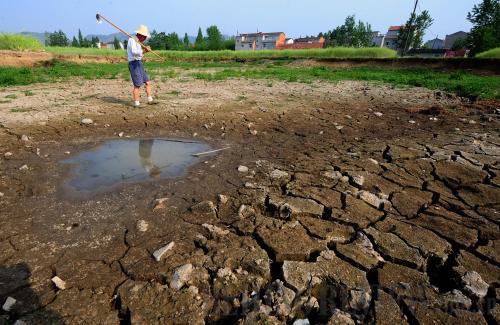|
 |
|
THIRSTY LAND: A farmer in Hubei Province walks on a dried-up pond nearby on May 4 (XINHUA) |
Anti-Drought Efforts
Statistics from the Office of State Flood Control and Drought Relief Headquarters show that 4,535 mu (302 hectares) of farming land in Hubei, Hunan, Jiangxi, Anhui and Jiangsu provinces in the middle and low reaches of the Yangtze River had been hit by severe drought up to May 29, accounting for more than 40 percent of the total drought-ridden area of the country this year. At the same time, 3.29 million people in the area have been having difficulty in obtaining supplies of drinking water.
It is urgent the central and local governments make the utmost efforts to fight against the drought—finding water, transferring water, and pumping water to meet farmers' basic living needs, and to minimize losses.
But, in the long run, the work should not stop at merely coping with drought. Although we have developed many methods of dealing with various natural disasters, such as drought and flooding, the frequent droughts of past years show a series of new problems have emerged. Rapid economic and social development have imposed huge pressure on water supply. In many places, overuse of water has already caused serious damage to local water resources.
Lack of effective emergency schemes and professional teams has resulted in helplessness and huge losses on all sides in dealing with disasters.
Droughts will one day draw to an end. But, for China, a country frequently hit by droughts, fighting them is a long-term task. Improving drought control systems and handling issues concerning water resources properly are the fundamental solutions.
People's Daily
Complaints Channel
A female resident in Xi'an, capital city of Shaanxi Province, has complained about noise pollution for five years. But her efforts have been fruitless. The environment monitoring station of the Xi'an Environmental Protection Bureau refused to carry out noise monitoring, saying that her complaint was not "serious" enough. That is, only when it was made known to the public would the issue be brought on to an agenda and moves made toward resolution.
Nothing related to the public interest should be taken as trivial. If people are in difficulties, either big or small, government departments are supposed to help them as quickly as possible.
In a society based on the rule of law, governmental behavior like the Xi'an Environmental Protection Bureau's is especially dangerous. If people's complaints are attended to only when they are made known to the public, the government's credibility will be damaged. It will also lead to growing dissatisfaction of the public with the government. This may also make people turn to extreme means to settle difficulties and protect their interests.
People's Daily
Vocational Education
The Ministry of Education of China recently demanded the country's secondary vocational schools recruit 8.2 million students in 2011.
China's economic growth needs an enormous number of blue-collar workers and skillful laborers. Since 2005, secondary vocational schools have begun to expand recruitment to meet this need.
But these kinds of secondary vocational schools have been neglected by Chinese students in recent years. Most junior high school students choose to go to senior high schools after graduation, rather than vocational schools.
For example, the recruitment plan for Hebei Province in 2011 is 445,000 students, equal to last year. But the facts are in 2010, the total number of students taking part in the senior high school entrance examination was 700,000, and 450,000 of them chose to go to normal senior high schools, leaving 250,000 behind. Even if all of the 250,000 students go to vocational schools, there is still a gap of 200,000 students against the province's recruitment plan.
Students have reasons to reject vocational education. In most cases, after three years' vocational training, at the cost of both time and money (although tuition is free in some places), students find themselves still unable to find a good job.
Given this embarrassing situation, it's time to rethink the country's vocational education system and work out a better mode.
Beijing Evening News
Maths Monster
When celebrating this year's Children's Day with young students, Wang Yang, Secretary of the Guangdong Provincial Committee of the Communist Party of China, said he thought the International Mathematical Olympiads (MO) should be cancelled. His proposal to some extent reflects the wishes of students and their parents, who have had to live under the shadow of the MO for a long time.
Normally, the MO could simply be a choice of hobby or personal interest, just like art and sport. It can help students develop certain ways of thinking. Children should have the freedom to choose to attend or otherwise. The MO scores should not be used as criteria to judge whether a student is smart or not.
But in China, the MO is tied to regular education. Students doing well in the MO will gain extra marks in high school and college entrance examinations. The MO is doing much more harm than good to young students in China. Primary school students are working on junior high school mathematics and junior high school students are working on senior high school mathematics.
The duty of education is to impart knowledge and help students develop good personalities. Nowadays, schools in China are more like workshops where students are classified according to their exam score. In this mode, students' freedom, creativity and nature are gradually withering.
Yangcheng Evening News | 